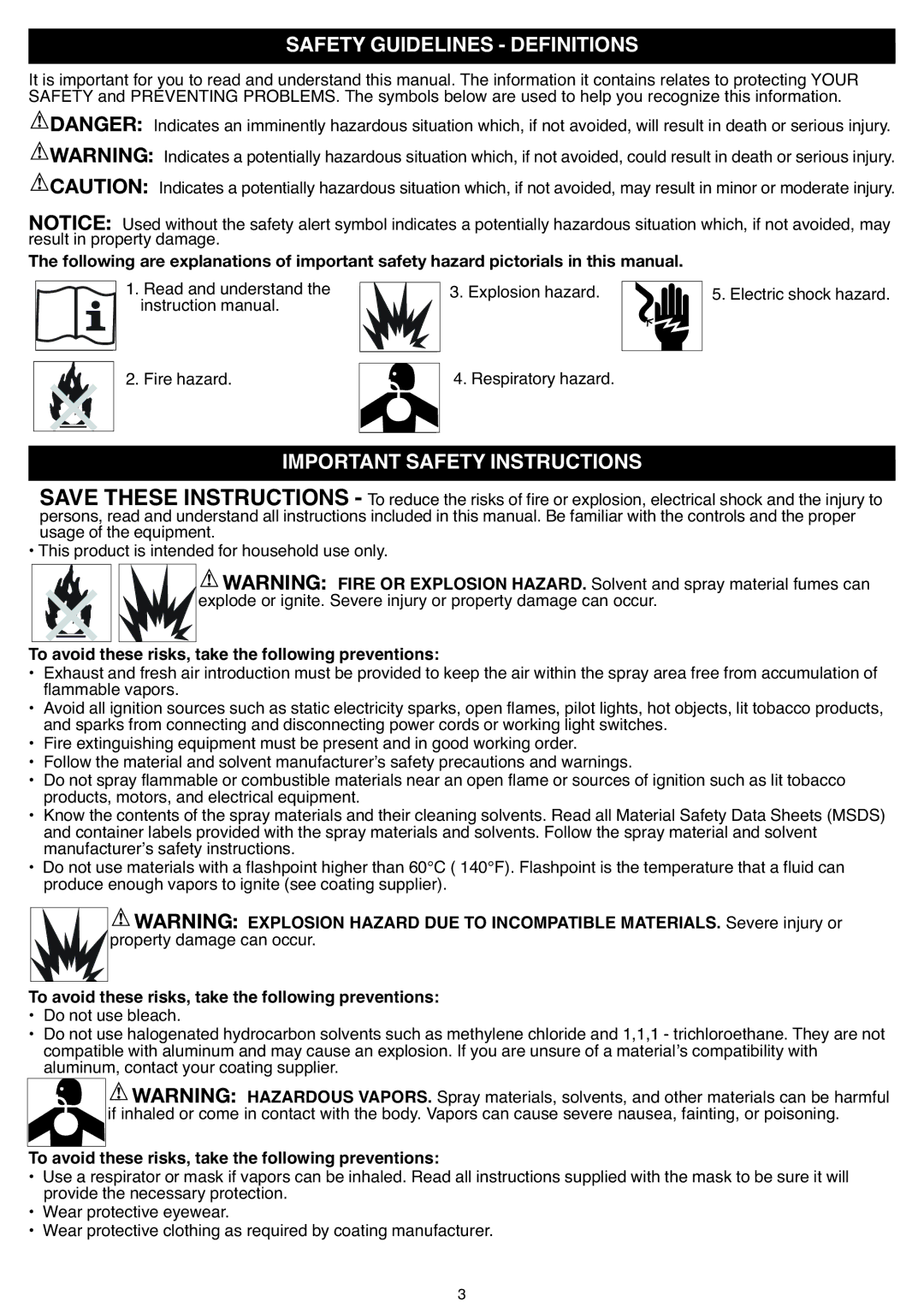
SAFETY GUIDELINES - DEFINITIONS
It is important for you to read and understand this manual. The information it contains relates to protecting YOUR SAFETY and PREVENTING PROBLEMS. The symbols below are used to help you recognize this information.
DANGER: Indicates an imminently hazardous situation which, if not avoided, will result in death or serious injury.
WARNING: Indicates a potentially hazardous situation which, if not avoided, could result in death or serious injury. ![]() CAUTION: Indicates a potentially hazardous situation which, if not avoided, may result in minor or moderate injury.
CAUTION: Indicates a potentially hazardous situation which, if not avoided, may result in minor or moderate injury.
Used without the safety alert symbol indicates a potentially hazardous situation which, if not avoided, may resultNOTICE:in property damage.
The following are explanations of important safety hazard pictorials in this manual.
1. Read and understand the3. Explosion hazard. instruction manual.
2. Fire hazard. | 4. Respiratory hazard. |
IMPORTANT SAFETY INSTRUCTIONS
SAVE THESE INSTRUCTIONS - Toreduce the risks of fire or explosion, electrical shock and the injury to persons, read and understand all instructions included in this manual. Be familiar with the controls and the proper usage of the equipment.
• This product is intended for household use only.
FIRE OR EXPLOSION HAZARD. Solvent and spray material fumes can
explodeWARNING:or ignite. Severe injury or property damage can occur.
To avoid these risks, take the following preventions:
• Exhaust and fresh air introduction must be provided to keep the air within the spray area free from accumulation of flammable vapors.
• Avoid all ignition sources such as static electricity sparks, open flames, pilot lights, hot objects, lit tobacco products, and sparks from connecting and disconnecting power cords or working light switches.
• Fire extinguishing equipment must be present and in good working order.
• Follow the material and solvent manufacturerʼs safety precautions and warnings.
• Do not spray flammable or combustible materials near an open flame or sources of ignition such as lit tobacco products, motors, and electrical equipment.
• Know the contents of the spray materials and their cleaning solvents. Read all Material Safety Data Sheets (MSDS) and container labels provided with the spray materials and solvents. Follow the spray material and solvent manufacturerʼs safety instructions.
• Do not use materials with a flashpoint higher than 60°C ( 140°F). Flashpoint is the temperature that a fluid can produce enough vapors to ignite (see coating supplier).
EXPLOSION HAZARD DUE TO INCOMPATIBLEMATERIALS. Severe injury or
propertyWARNING:damage can occur.
To avoid these risks, take the following preventions:
• Do not use bleach.
• Do not use halogenated hydrocarbon solvents such as methylene chloride and 1,1,1 - trichloroethane. They are not compatible with aluminum and may cause an explosion. If you are unsure of a materialʼs compatibility with aluminum, contact your coating supplier.
HAZARDOUS VAPORS. Spray materials, solvents, and other materials can be harmful
if![]() inhaledWARNING:or come in contact with the body. Vapors can cause severe nausea, fainting, or poisoning.
inhaledWARNING:or come in contact with the body. Vapors can cause severe nausea, fainting, or poisoning.
To avoid these risks, take the following preventions:
• Use a respirator or mask if vapors can be inhaled. Read all instructions supplied with the mask to be sure it will provide the necessary protection.
• Wear protective eyewear.
• Wear protective clothing as required by coating manufacturer.
3
